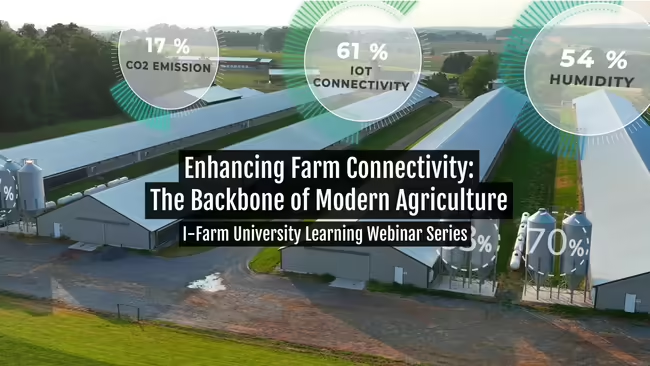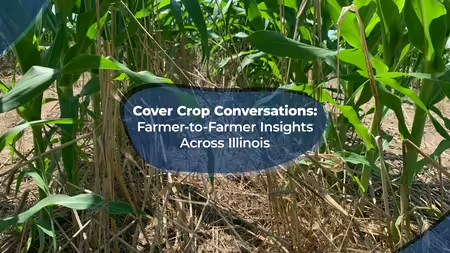
Connectivity allows farmers to stay in the know on building conditions, equipment, and livestock to keep their operation going.
Delve into the critical role of connectivity in modern farming. The first session of the I-FARM webinar series will explore the various technologies enabling seamless communication between farm equipment, sensors, and management systems. Attendees will learn about the latest advancements in IoT, satellite, and wireless communication technologies that are transforming the agricultural landscape.
Presenter: Deepak Vasisht, assistant professor, Computer Science, University of Illinois Urbana-Champaign.
About the I-FARM Learning Series
The I-FARM University Learning Series provides a comprehensive exploration of cutting-edge technologies and economic strategies shaping modern agriculture. Each session, led by experts in their respective fields, will offer valuable insights and practical knowledge for enhancing farm productivity and sustainability. Sessions begin at 11 a.m. on the second Thursday of the month through December. Learn more about the series and register at go.illinois.edu/IFARM2024.
The free series is co-sponsored by the University of Illinois Urbana-Champaign Center for Digital Agriculture, Agricultural Safety & Health Program, National Center for Supercomputing Applications, Institute for Sustainability, Energy, and Environment, College of Agricultural, Consumer and Environmental Sciences, farmdoc, and University of Illinois Extension.
Program contact: Salah Issa, assistant professor and Extension specialist, agricultural and industry safety and health in the Department of Agricultural and Biological Engineering, part of the College of ACES.
Additional Series Sessions
Farm Robotics: Revolutionizing Agricultural Practices | Sept. 12, 11 a.m.
Explore the transformative impact of robotics in agriculture. The second series session will highlight the latest innovations in agricultural robots, including planting, harvesting, and monitoring robots. Attendees will learn about the benefits and challenges of integrating robots into farm operations and the future of robotic technology in agriculture. Presenter: Naveen Uppalapati, research scientist, Center for Digital Agriculture, University of Illinois Urbana-Champaign.
Economics of Adopting Weeding Robots | Oct. 10, 11 a.m.
Examine the economic aspects of adopting weeding robots on farms. The third series session will cover how robot prices, corn prices, the robot weeding efficacy, and a farmer’s planning horizon affect how many robots to adopt and to what extent weeding robots can increase farm profitability and reduce weed resistance to herbicides. Presenter: Shadi Attallah, associate professor, Agricultural and Consumer Economics at ACES, University of Illinois Urbana-Champaign.
Smart Grazing: AI Integration into Grazing Management | Nov. 14, 11 a.m.
Learn about the innovative work in the use of sensors and AI models in grazing management. The fourth series session will cover how advanced technologies can be used to monitor and manage livestock grazing patterns. Attendees will gain insights into the design and deployment of these technologies and how they can improve pasture utilization, livestock health, and overall farm efficiency. Presenter: Isabella Condotta, associate professor, Animal Sciences at ACES, University of Illinois Urbana-Champaign.
Bridging the Gap: Technology Adoption in Small Holder Farms | Dec. 12, 11 a.m.
Discuss the unique challenges and opportunities smallholder farms face in adopting new technologies. This final series session will explore practical solutions and case studies of successful technology integration in small-scale farming. Attendees will learn about the barriers to adoption and strategies to overcome them. Presenter: Gregory Bernard, assistant professor, Plant and Soil Science, Tuskegee University.
